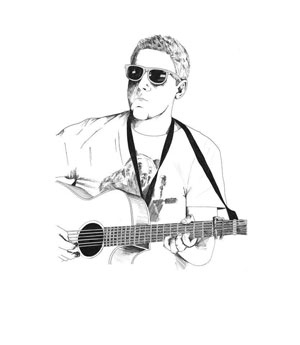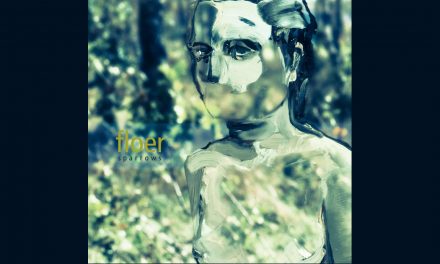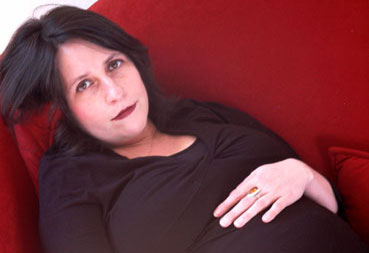Bonfire Music
★ ★ ★ ★

By David Mumford
Originally, I thought I’d just make a ‘best of’ album. That seemed like a good idea. Just record my ten best songs. So I started whittling down a random collection of around 30 ditties, trying to decide which ones were the best. That took a while. I had to be brutal. I had to kill my darlings, and I didn’t want to let them go—not like that.
But in a way, I found that I did want to be free of them, all those surplus songs. They would whisper—‘what about me? Get me recorded… tell my story…’—and I was tired of their ceaseless bleatings. Something had to be done. Songs are like little time capsules, reminding us who we were, who we loved, the lessons we’ve learned. Put them all together and you start to see how you’ve come to be the person you are. A horrifying prospect.
And there was the problem, because ultimately, it seemed that I faced a kind of paradox; on the one hand I knew I wanted to make an album, a record of some of the little stories of my life that I could share with people, and a way of just getting rid of some of that song-baggage, of silencing some of those mithering, song-voices. But on the other hand, I had absolutely no interest in any kind of mature, adult review of the kind of person I was.
And so, as with most real-life paradoxes, I resolved to do nothing, and decided to just feel frustrated and sorry for myself instead. Time passed. But the murderous rage never abated—I knew that sooner or later the songs had to die. But how to do it? That was the question. How could I make an album and free myself of a bunch of history, whilst at the same time avoiding the abject misery of self-examination?
In the end, I realised it was all just nonsense. Songs don’t have voices. There was no paradox. And I wasn’t some remorseless killer, bent on the destruction of my own past. I was just afraid that people wouldn’t like the album that I really wanted to make, that’s all.
So I scrapped my ‘best of’ idea. I went back and resurrected some of my poor, murdered darlings—songs half-finished, songs with no name. I bid them welcome with arms outstretched, as they rose from their shallow graves and clambered back towards me like the ghouls they truly were. I made them all sit round a table, in some semblance of an order, and with the help of my friend Mike Wilton, we duly set about tarting them up, making them presentable to the outside world, as they croaked and groaned and shifted about. Some wanted eyes to weep and remember the good old days, so we gave them eyes. Some wanted teeth, to bite, so we gave them teeth. Others just wanted to party and fool about and not mix with the others—we shot those ones in the head and promptly buried them again.
And when we were done, Dr Wilton and I, the album was an altogether different beast, for better or worse. I hadn’t planned on making a ‘concept album’, but that seemed to be what had happened. Bonfire Music tells the story of a boy, so desperate in his quest for adulthood that he ventures to the dark heart of a forest, where he means to take all the songs and stories of his young life and set them alight on a bonfire. On the one hand it’s a cautionary tale, but on the other it’s a celebration of independence, of growing up, of saying balls to everything and everyone and just going off and doing your own thing.
Making this album was many things, but mainly, it was a pain in the arse—make no mistake. It wasn’t meant to be, but it was, and I was glad when it was finally over. It took me 15 years to write those songs and two years to record them, and there were times when I thought I’d never get there.
At first, I wasn’t happy with the album at all. I knew I could’ve done a better job. But that was three years ago, and I’ve come to enjoy the album a bit more since then. I started giving it away for free online, and that helped a lot with making me less precious about the whole thing. But I think it’s mainly the time factor; I just don’t identify with the pain in the stories in Bonfire Music anymore. And maybe that was the point all along? To tell all the painful little stories of your life in such a way as to be free of them, eventually.
At the end of the album, the boy in my story mocks the bonfire he has created—his own collection of ‘painful little stories’. He mocks the rainclouds, the twinkling stars, and all the nightmares that threatened to gobble him up in the long dark hours he spent alone in the forest. ‘Hell no, I’m not coming back,’ he says.
I rather like that ending. My boy has had a rough night for sure, but he emerges victorious, if not slightly crazed. But I don’t mind that either; if he leaves the forest with a somewhat skewed perspective on life, that’s ok. He didn’t try to weasel out of dealing with his shit, and I like that. He discovers he is selfish, and is unconcerned with the outside world—unconcerned with bringing them any kind of “message”—and I like that even more.
My approach to songwriting has changed a lot since making this album. I think the slash-and-burn metaphor of the bonfire served its purpose just fine at the time, but that’s not a sustainable way to make music, and that’s not a sustainable way to live. Nowadays, I recognise the need to absorb stuff, rather than incinerate it. Life isn’t like a bonfire, not really. I prefer to think of it like some great, bubbling cauldron; from the minute we’re born, stuff just gets thrown in–some of it good, some of it bad, some we have control over, and some we don’t. Sometimes nothing happens, and all you get is tasteless broth. But sometimes things stick, and bind with each other, and one day you dip your hand in and pull out something you didn’t expect.
‘Bonfire Music’ and all David’s music is available for free download at https://davidmumfordmusic.bandcamp.com

David began songwriting in 2001 on a trip around the world, with a 6-chord songbook and cheap guitar as his tools and only companions. Alas, the boy-bands were dead and gone, so he turned instead to the likes of Paul Simon, Bob Dylan and The Beatles to show him the way. He released his debut album ‘Bonfire Music’ in 2013–a unique blend of acoustic roots, blues and folk music–and two more homemade albums followed in next couple of years. David gives away all his music for free online, and is happy for people to use his songs however they damn well please.




























Absolutely beautiful. Thanks so much.